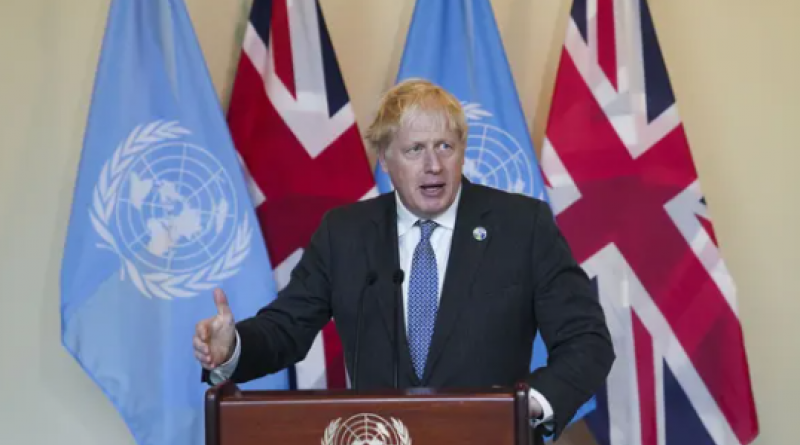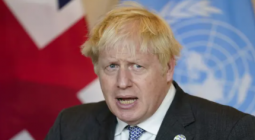Johnson says he has changed his mind on the climate – but he’s still dragging his feet

Outright denial has been replaced by something that may turn out to be even worse: delay.
As he flew to New York yesterday to speak to the UN general assembly about the Cop26 climate conference, Boris Johnson was asked to defend old comments made by his newly appointed trade secretary, Anne-Marie Trevelyan. Trevelyan had made statements on Twitter in the past decade promoting climate-denial literature, denying climate change was happening at all, and denigrating climate scientists and activists as “doom-mongers” and “fanatics”.
Johnson insisted that these views – despite coming from a minister whose role has serious climate implications – weren’t really such a big deal. In fact, he was himself guilty of similar statements not so long ago. He reminded the public that were we to “excavate some of [his] articles from 20 years ago”, it wouldn’t be difficult to find sentiments that “weren’t entirely supportive of the current struggle”, as he generously put it. “Facts change,” he added, “and people change their minds.”
Johnson is a man who questioned human-caused climate change as recently as 2015. We have to ask: has he truly seen the light? And has the Conservative party – long a bastion of organised climate denial – come along with him?
At a glance, the Tories’ new record – or at least rhetoric – looks good. Johnson continues to make strong, sober statements ahead of November’s Cop26 conference, and the party has nicked Labour’s “green industrial revolution” framing in its ambitions for “building back better” after the pandemic. It might seem that this Conservative party is a new beast: bring on all the “green crap” David Cameron once dismissed.
But critically, the Tories aren’t the only formerly denier-friendly party suddenly ready to discuss the C word, and anoint themselves heroic climate leaders. Public opinion on climate has changed rapidly, and now to appear credible, parties across the political spectrum must have a stance on the central crisis facing humanity.
Free-market stalwarts in the Republican party increasingly clamber over each other to prove their climate credentials. The fossil fuel majors and chemical giants are spending millions to rebrand as leaders in “clean energy” and “nature-based solutions”. Even Charles Koch – scion of disinformation campaigns and the fossil fuel lobby, and the gravedigger for countless climate regulations and actions – now seeks absolution for his role in obstructing climate action and fomenting political division. Nigel Farage, the golden boy of reactionary politics, now sits on the advisory board of a carbon-offsetting firm.
Contrast this with the political landscape of only a few years ago, and it certainly looks like times have changed. Outright denial of the climate crisis still exists, but thanks to decades of advocacy it has been pushed definitively to the fringes. To remain mainstream, politicians must at least speak to the reality of climate change.
But why, then, do we remain so perilously off-track for meeting even the inadequate target enshrined in 2015’s Paris agreement? How can it be, with all of this “consensus” on the need for action across the political spectrum that so little is changing? The simple answer is that denial has been replaced by a phenomenon that might just be worse: delay.
“Delayism” is in some respects the political equivalent of greenwashing: gesturing to a veneer of green policy, while the underlying problems remain unchanged and unaddressed. The politics of delay are those of acknowledging the reality of climate change, while ridiculing ambitious climate policy as a “green dream, or whatever”, or of weak incentives and nonbinding, intangible targets with no plans for meeting them.
Delayism builds a broad church, welcoming both those politicians who genuinely resist vital action on the climate crisis – pushing it far into the future – and those who are committed to half-hearted, inadequate or regressive solutions in the present.
Worryingly, this might be delayism’s most troubling form: the proliferation of false solutions that – in the same vein as greenwashing – contribute very little to curb emissions, while creating a false sense of progress that undermines the effective action we need. And they often lock in the injustices and inequalities that underlie the climate crisis in the first place.
From carbon offset programmes that drive land grabs in the developing world, to ineffectual carbon pricing schemes – something the US and EU have spent decades on to little effect – to the opportunism of “ESG investing”, which overwhelmingly provides the wealthy with an opportunity to profit from the transition, and the widespread harms caused by mineral extraction in the global south, often devastating communities to support the green demands of the wealthy, the ‘green transition’ is increasingly recognised as an opportunity for the accumulation of wealth and pursuit of profit. Actual progress seems to come second, if at all.
Left to their own devices, the champions of this new green politics will continue to talk a good game on climate, while ensuring that little about the world actually changes. This makes it difficult to address the climate crisis at all, and impossible to address it in a way that is fair and equitable to the billions of people who did little to create the crisis – but will bear the brunt of its effects.
Whether that means weakening emission targets and accountability in international treaties to minimise disruption to wealthy economies; prohibiting the use of climate-related language in trade agreements; or pouring money into the environmentally destructive and resource-intensive electric vehicle industry rather than investing in the societal shifts in mobility and mass transit that will necessarily support a decarbonised future.
If recent shifts in politics have shown that accepting the need to decarbonise is no longer the dividing line, they have just as clearly underscored that the path we take and the speed we travel will be the central battle in the years to come. The fight is no longer between “the science” and conspiracy. Climate action – however patchy, unjust or ineffective it may largely be – is happening.
Securing the pace, scale and shape of action that we need and which justice demands means freeing our collective capacities from the imperatives of accumulation. We have to hold our leaders accountable to their newfound green rhetoric – or it will remain just that. Denialism may have been bad, but delay could be just as harmful.
-
Adrienne Buller is a senior research fellow at Common Wealth. Her work focuses on the relationships between the finance and the climate crisis.
21 September 2021
The Guardian




